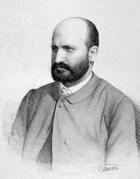
Pedro Antonio de Alarcón y Ariza (Guadix, March 10, 1833-Madrid, July 19, 1891) was a Spanish writer who belonged to literary realism, in which he stood out as one of the architects of the end of romantic prose. However, researchers such as Ferreras consider that "a good part of his books are inspired by romanticism" and that Alarcón "fought all his life against totalizing realism". For his part, Florensa warns that "the trend has been unanimous in affiliate him with Byron, Hugo and Espronceda without discovering that Alarcón's major works criticize such romanticism and that they do so from the postulates of another romanticism, the traditionalist and Christian one of Schlegel and Böhl de Faber". Alarcón himself expresses himself on the Realism, in the following way, in 1883: Write another half dozen books, these French realists and naturalists, and they will have buried in their own mud that sad school that I will call, not exactly the black hand, but the literary dirty hand! . And it is that, as Shaw explains in his Historia de la literatura española, Alarcón, in line with the Spanish literary criticism of the 19th century, defends the "poetization" of reality, that is, the observation of it in an idealizing direction.








